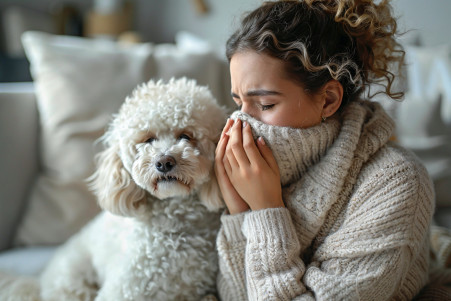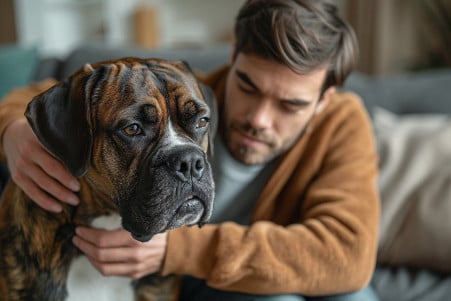Can Dogs Burp? What to Know About Canine Digestion
2 February 2024

Dog owners are no strangers to strange behaviors, but does that include the doggy equivalent of a burp? It turns out that yes, dogs can burp, and it’s a completely normal way for them to get rid of gas that has accumulated in their stomachs.
While the occasional burp is nothing to worry about, if your dog is burping a lot, it could be a sign of a digestive issue that needs to be addressed by a vet.
This article will take a deep dive into the world of dog biology and behavior to explain exactly how and why dogs burp. We’ll cover everything from information from vets and research on dog digestion to the signs that dogs give off when they’re experiencing discomfort or relief from gas.
By the end, you’ll not only have your questions answered but you’ll also have a better idea of how to tell if your dog is feeling good or not.
Can dogs burp as a normal way to expel gas from their stomachs?
Gas in the Dog Digestive System
As in humans, the dog digestive system is responsible for breaking down food, absorbing nutrients, and creating gas. According to VCA Animal Hospitals, gas can be created by the swallowing of air, fermentation of food by bacteria in the intestines, and the diffusion of gas from the blood. When a dog releases gas from the stomach by mouth, it is called burping.
Dogs that eat too quickly and swallow air (aerophagia) are the most common cause of burping. According to Petcube, other causes of burping in dogs include dietary factors such as eating high-fiber foods and consuming specific proteins like soybean meal. In addition, certain breeds, especially those with brachycephalic skulls like pugs and bulldogs, are more likely to swallow air and burp because of their anatomy and eating habits.
While burping is a normal part of the digestive process in dogs, it can be influenced by a number of factors including diet and eating habits. This is important to know if you want to keep your dog’s digestive system healthy, especially since the dog digestive system is different from the human digestive system in several ways.
Digestive Differences: Why Dogs Burp So Differently From People
Knowing the differences in the digestive systems of dogs and humans helps explain why the act of burping is so different for our furry friends. Dogs have 42 teeth that are designed for tearing, while humans have 32 teeth that are designed for grinding. This difference in dentition is a reflection of the dietary habits and the way food is processed in each species.
Human saliva contains amylase, which is an enzyme that starts the digestion of carbohydrates, but dog saliva does not contain this enzyme, which is an indication of the carnivorous nature of their evolution, according to Vetericyn.
In addition, the pH of the gastrointestinal tracts of humans and dogs, as well as the bile composition and digestive enzyme activity, are different, which impacts the way food is processed and the production of gas, according to PubMed.
Dogs have a much higher stomach acidity, up to 100 times more acidic than humans, which helps them break down protein and bone much more quickly, according to Vetericyn. This higher acidity could mean that dogs have a different pattern of burping than humans.
While the frequency of burping in dogs versus humans has not been well-documented, the anatomical and biochemical differences between the two species suggest that the burping mechanism may have different functional purposes. While these differences have not been well-studied, they do suggest that the management of digestive health in dogs should be tailored to their specific needs, which brings us to the next topic of study: the health impacts of burping in dogs.
When Burping in Dogs May Be a Sign of a Health Problem
While the occasional burp is nothing to worry about, frequent or excessive burping in dogs can be a sign of an underlying health issue.
Hill’s Pet explains that gastrointestinal disorders in dogs can be acute, like gastroenteritis, which is often caused by dietary indiscretions or infections, or chronic, like inflammatory bowel disease.
Other symptoms that may be present with excessive burping are vomiting, diarrhea, weakness, and changes in appetite. If these symptoms are ongoing, you should take your dog to the vet. Hill’s Pet stresses that it’s important to see a vet if you notice these symptoms on an ongoing basis.
The Merck Veterinary Manual lists bloat (Gastric Dilation and Volvulus) and pancreatitis as examples of conditions that can cause excessive burping and are considered emergencies. Treatment for burping-related conditions can include dietary changes, fluid therapy, anti-inflammatory drugs, and even surgery in severe cases.
Since there are so many potential causes and treatments, it’s important to see a vet if you notice that your dog is burping more than usual. By doing so, you can help prevent complications and ensure that your dog is comfortable and healthy.
How to Help Your Dog With Gas and Burping
To help your dog maintain a healthy digestive system and reduce gas and burping, you can take a few steps. First, make sure your dog is eating a healthy, balanced diet. WebMD recommends avoiding foods that are hard for dogs to digest, like dairy, soybeans, peas, and high-fat foods to help reduce gas.
Instead, look for dog foods that include high-quality ingredients at the top of the ingredient list, especially when it comes to protein sources. In addition, make sure to make dietary changes gradually, as sudden changes can lead to gas.
You can also help your dog by creating a better eating environment. For dogs that eat too quickly and swallow air (a behavior known as aerophagia), slow-feeding bowls can help slow down eating and reduce the amount of air that’s swallowed during meals.
For immediate help, keeping your dog active and considering giving your dog probiotics to help with digestion can help you manage gas, according to WebMD. That said, if your dog is eating a high-quality diet and still experiencing gas, it could be a sign of poor digestion or an intolerance, so you should have your dog evaluated by a vet.
If you’ve made changes to your dog’s diet and tried home remedies and your dog is still experiencing gas, or if your dog’s gas is accompanied by other symptoms like weight loss or diarrhea, you should take your dog to the vet.
A vet can perform a thorough examination to help rule out more serious issues like inflammatory bowel disease or pancreatitis, according to VCA Hospitals.
By making sure to keep an eye on your dog’s overall health, not just their burping, you can make sure that you’re addressing any underlying issues that may be present in a timely and effective manner.
Understanding Your Dog’s Pre- and Post-Burp Body Language
You can often tell if your dog needs to burp or has just burped based on their body language. According to Turid Rugaas, author of On Talking Terms With Dogs: Calming Signals, dogs communicate with each other using a complex system of body language.
Some of the more subtle signs, like a quick head turn or a lip lick, can indicate that your dog is uncomfortable and may need to burp. If they have just burped, they may look more relaxed, which can indicate that they have found relief from their gas.
Best Friends Animal Society also points out that dogs may need to burp if they are exhibiting signs of stress, like panting, yawning, or pacing. If your dog is pacing or seems restless, or if they are swallowing a lot, it may be a sign that they are about to burp or that they are uncomfortable due to gas.
It’s important for dog owners to know these signs. If you know what to look for, you can help your dog more quickly when they are uncomfortable and have a better understanding of their overall health. This understanding of dog body language can lead to better care and a stronger bond between dogs and their owners. By recognizing and responding to these signs, you can help ensure that your dog is happy and healthy.
In Conclusion: Everything You Need to Know About Dog Burps
We’ve now demystified the phenomenon of dog burps, proving that dogs do burp and that it’s a completely normal part of their digestive process. We’ve looked at the details of a dog’s digestive system and the many things that can impact burping, from what they eat to the kind of dog they are, and in doing so, we’ve learned about the science behind this common but often overlooked behavior.
We’ve also compared the way dogs and humans burp and in doing so, we’ve shown that dogs burp less often and for different reasons than humans, and we’ve also shown that the way dogs burp is directly related to their digestive system.
That said, the fact that dogs burp can also be a sign of something more serious. That’s why it’s important for dog owners to know the difference between normal and abnormal burping and when it might be time to see a vet.
In the end, the way to keep your dog healthy and happy is to be in tune with their digestive system. That means keeping an eye on what they eat, how they eat, and how they act, and in doing so, you can keep them from experiencing any digestive distress. In the end, this knowledge will help you bond with your dog and show them the best care possible.


